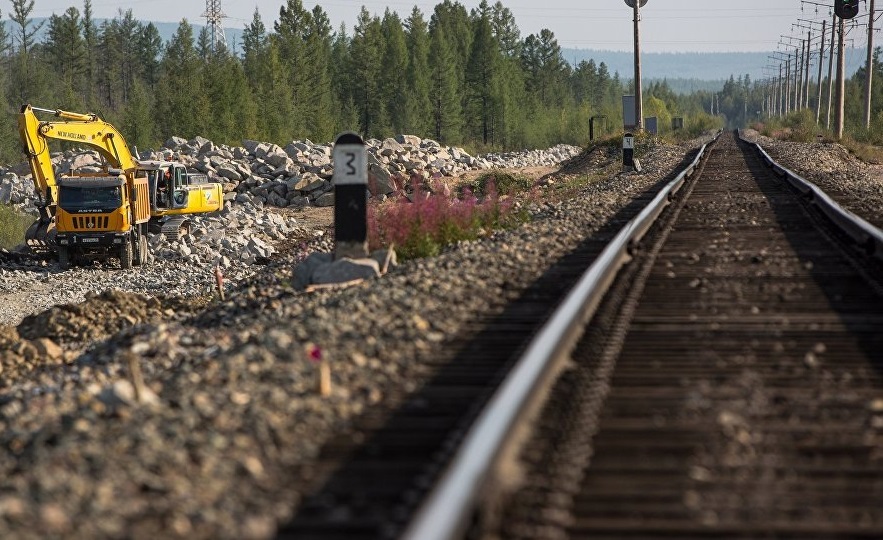Kazakhstan and Russia are expected to help fund the construction of a railway line in Afghanistan that may connect Europe and South Asia.
The railway agencies of Russia, Kazakhstan, Uzbekistan, Afghanistan and Pakistan agreed last week on the creation of a financial consortium for the construction of the Mazar-i-Sharif-Kabul-Peshawar railway. Details of the deal, including the cost to build the railway, were not disclosed.
The new railway line is supposed to become a part of a trade and transportation corridor connecting the European Union, Russia, Kazakhstan, Uzbekistan, Afghanistan, Pakistan and India. It will connect Afghanistan’s northern city of Mazar-e Sharif with the country’s capital, Kabul, and extend eastwards to the Pakistani city of Peshawar. Currently, the road length between these three cities amounts to 716 km and it takes more than 12 hours to travel the distance.
In addition, the parties to the agreement announced their intent to build high-voltage power lines along the railway line once it is built. Officials in Uzbekistan, which is bordered by Afghanistan in the south, say it will help electrify the new line.
“Another favorable factor for the implementation of the project is that the high-voltage power lines Surkhan – Puli-Khumri – Doshi – Surabai – Jalalabad – Peshawar (Pakistan) are planned to be constructed along the proposed railway line,” read a statement by Uzbek Railways, according to Sputnik.
Uzbekistan’s transportation officials believe the project is of high significance, as there is a need to find alternative land routes through which goods can be delivered to Europe and in the opposite direction. Once the railway is completed it will be connected to the existing railway infrastructure that links Uzbekistan, Kazakhstan, Russia and Europe.
Kazakhstan, which has no direct border with Afghanistan, has both economic and political interest in the project. As the largest and wealthiest country in Central Asia, Kazakhstan has long been striving to become a logistics hub in the region. Officials in Astana believe the proposed route will create additional opportunities for the country, but on the other hand, worry about terrorism in Afghanistan that could creep into Kazakhstan.
Along with the Mazar-i-Sharif – Kabul – Peshawar railway, Afghanistan’s neighbors and allies are keen to launch the railway line that will link Mazar-i-Sharif to Herat, the country’s city bordering Iran. Russia has already announced its readiness to join the project, which is expected to provide 30,000 Afghans with jobs.
“We claim to participate in the construction of the railway that will connect the two major centers in Afghanistan – these are the cities of Mazar-i-Sharif and Herat. The cities have an access to Iran, Tajikistan, and China,” Yury Sentyurin, Russia’s Deputy Energy Minister told RIA Novosti last November.
Sentyurin says this project will allow creating a major railway stretching from China to the ports of the Persian Gulf through the territories of Afghanistan, Tajikistan, Iran and Central Asian states.
According to preliminary estimations, the implementation of this project will make it possible to increase the trade turnover of Afghanistan by about 50 percent, and provide Afghanistan and the countries of Central and South Asia with an opportunity to get access to the global market. The total cost of the project is said to be about $3 billion.







 The Mine Action Agency of Azerbaijan (ANAMA) reported on Thursday the discovery of a significant amount of explosives in the Khojavand district of ...
The Mine Action Agency of Azerbaijan (ANAMA) reported on Thursday the discovery of a significant amount of explosives in the Khojavand district of ...
 Iran has refuted reports of alleged damage to Shimon Peres Negev Nuclear Research Centre located southeast of Dimona, Israel, during the recent air...
Iran has refuted reports of alleged damage to Shimon Peres Negev Nuclear Research Centre located southeast of Dimona, Israel, during the recent air...
 Iran’s Foreign Minister, Hossein Amir-Abdollahian, has labeled a foiled Israeli drone attack in certain parts of the country as a "failure" for Isr...
Iran’s Foreign Minister, Hossein Amir-Abdollahian, has labeled a foiled Israeli drone attack in certain parts of the country as a "failure" for Isr...



